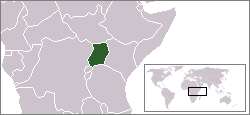Uganda Protectorate
| Protectorate of Uganda | ||||||||||
| Protectorate of the United Kingdom | ||||||||||
|
||||||||||
|
||||||||||
|
Anthem God Save the King/Queen • Oh Uganda, Land of Beauty (instrumental only) |
||||||||||
| Capital | Entebbe | |||||||||
| Languages |
English (official) Luganda, Swahili, Southern Luo, Nkore widely spoken |
|||||||||
| Religion | Christianity, Islam | |||||||||
| Government | Protectorate | |||||||||
| Historical era | New Imperialism | |||||||||
| • | Protectorate established | 1894 | ||||||||
| • | Self government | 1961 | ||||||||
| • | Independence | 9 October 1962 | ||||||||
| Currency |
Rupee (1894–1921) East African shilling (1921–1962) |
|||||||||
|
||||||||||
| Today part of |
|
|||||||||
The British Protectorate of Uganda was a protectorate of the British Empire from 1894 to 1962. In 1893 the Imperial British East Africa Company transferred its administration rights of territory consisting mainly of Buganda Kingdom to the British Government.
In 1894 the Uganda Protectorate was established, and the territory was extended beyond the borders of Buganda to an area that roughly corresponds to that of present-day Uganda.
From 1885 to 1887 the kingdom of Buganda fell into a religious civil war with Protestants, Catholics and Muslim factions vying for control. Apolo Kagwa, still in his twenties, was from early on recognised as the leader of the Protestant faction. The Muslims were in ascendancy in the early part of the war, and Kagwa and other Protestants spent some time in exile in the neighboring kingdom of Ankole. King Mwanga, temporarily deposed, was restored in 1890 with the assistance of the Protestants, and Kagwa was named Katikkiro (Prime Minister). King Mwanga was again deposed in 1897 when he rejected British rule and led an unsuccessful fight for independence. An infant prince, Daudi Chwa, was named King with Kagwa as one of three regents. Kagwa was one of the negotiators of the Uganda Agreement, by which Buganda became a British protectorate with limited internal autonomy.
The Uganda Agreement of 1900 solidified the power of the largely Protestant 'Bakungu' client-chiefs, led by Kagwa. London sent only a few officials to administer the country, relying primarily on the 'Bakungu' chiefs. For decades they were preferred because of their political skills, their Christianity, their friendly relations with the British, There are their ability to collect taxes, and the proximity of Entebbe (the Uganda capital) was close to the Buganda capital. By The 1920s the British administrators were more confident, and have less need for military or administrative support. Colonial officials taxed cash crops produced by the peasants. There was popular discontent among the Baganda rank-and-file, which weakened the position of their leaders. In 1912 Kagwa moved to solidify 'Bakungu' power by proposing a second 'Lukiko' for Buganda with himself as president and the 'Bakungu' as a sort of hereditary aristocracy. British officials vetoed the idea when they discovered widespread popular opposition. Instead British officials began some reforms and attempted to make the 'Lukiko' a genuine representative assembly.
...
Wikipedia



